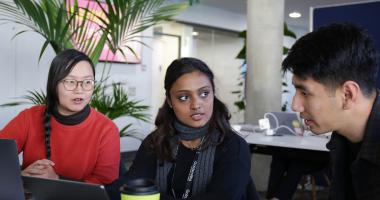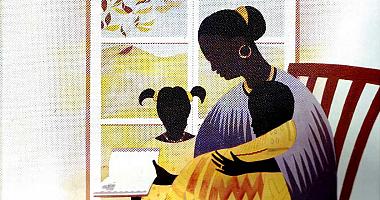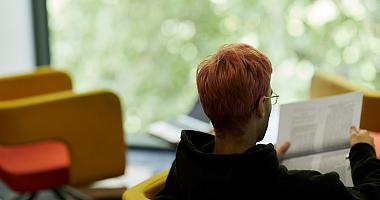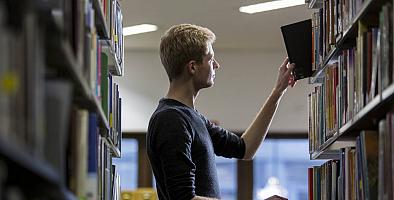You will complete two compulsory modules, two option modules, and a dissertation.
Compulsory modules
Please note: Students who have successfully completed a previous linguistics degree may apply to replace one of the following compulsory modules with an additional linguistics option module. You would then complete only one compulsory module, three option modules, and a dissertation. Please state your wish to follow this trajectory clearly in your application and provide detailed information about the content of your previous degree. The final decision will be made by the admissions tutor after reviewing your application.
| Module title |
Credits |
|
Core Issues in English Language & Linguistics
|
30 credits |
|
Language in its Sociocultural Context
|
30 credits |
Option modules
You may choose two linguistic options or one linguistic option and one option from other MA programmes within the College, where specifically approved by the Programme Co-ordinator.
| Module title |
Credits |
|
Discourse and Identity in Spoken Interaction
|
30 credits |
|
English in a Multilingual World
|
30 credits |
|
Intercultural Discourse & Communication
|
30 credits |
|
Language & Ideology in Written Discourse
|
30 credits |
|
English as a Lingua Franca and Language Teaching
|
30 credits |
We also run many optional MA linguistic study skills sessions in which we cover topics such as: fieldwork and methodology; using electronic resources; British academic essay writing & referencing at MA level; giving presentations; planning a dissertation in (socio)linguistics.
You may also choose one non-linguistics module, either from our own department (English and Creative Writing) or from another department. Availability of options across the College varies, but typically you can choose from the following selection. Please note that your choice of option module from another department needs to be discussed with the Programme Co-ordinator of the MA Sociocultural Linguistics in advance.
Sociology options
| Module title |
Credits |
|
What is Culture - Key Theoretical Interventions
|
30 credits |
|
Social Media: A Critical Review
|
30 credits |
|
Gender, Sexuality and Media
|
30 credits |
|
Race, Gender And Social Justice
|
30 credits |
|
Stories and the Social World: Identity, Politics, Ethics
|
30 credits |
Media and Communications options
| Module title |
Credits |
|
Political Economy of the Media
|
15 Credits |
|
Promotional Culture
|
30 credits or 15 credits |
|
Race, Empire and Nation
|
15 credits |
|
Gender Affect and the Body
|
30 credits |
|
Social Media in Everyday Life: A global perspective
|
15 credits |
|
Race and the Cultural Industries
|
30 credits |
Anthropology options
| Module title |
Credits |
|
Anthropology and Gender Theory
|
15 credits |
|
Anthropology and Cultural Politics
|
30 credits |
|
Anthropology and History
|
30 credits |
Educational Studies options
| Module title |
Credits |
|
Culture, Language and Identity in Education
|
30 credits |
|
Race, Culture and Education
|
30 credits |
English and Creative Writing options
| Module title |
Credits |
|
Studies in Comparative Literature & Criticism
|
30 credits |
|
Theories of Literature & Culture
|
30 credits |
|
Modern and Contemporary Literary Movements
|
30 credits |
|
Literature of the Caribbean & its Diasporas
|
30 credits |
|
The Contemporary American Novel in the Era of Climate Change
|
30 credits |
|
Interculturality, Text, Poetics
|
30 credits |
|
Thinking Translation: Introduction to Translation Theory
|
30 credits |
|
Becoming A Translator
|
30 credits |
|
Translation for the Cultural Tourism, Hospitality and Cultural Heritage Sectors
|
30 credits |
|
Postcolonial Fiction: Theory and Practice
|
30 credits |
|
Palestine and Postcolonialism
|
30 credits |
|
Caribbean Women Writers
|
30 credits |
|
Postmodern Fiction
|
30 credits |
We also run an optional MA study skills module in which we cover topics such as: fieldwork and methodology; using electronic resources; British academic essay writing & referencing at MA level; planning a dissertation in (socio)linguistics.
Dissertation
You also produce a dissertation. Dissertation topics in the past have included:
- Performing multilingual identities online: A multimodal analysis of language practices by a Quebecois Instagram influencer
- ‘Solving The Migration Crisis’: Common-Sense and Morality in Government Statements for The Nationality and Borders Bill
- 'The Conflict between Saudi National Identity and Feminism: Critical Discourse Analysis of a Debate between an Anti-feminism Female Member of Shura Council and a Male Feminism Defender
- Finding the connection between queerness and villainy: deconstructing heteronormativity in Disney’s films
- Pathologised, Patronised, and Hypersexualised: A Feminist Critical Discourse Analysis of how MailOnline presented female fans of One Direction, 2011-2015
- A semiotic analysis of the depiction of LGBTQ+ lives and narratives as presented by LGBTQ+ movie posters released in the UK from 2002-2022
- Reclaiming the Narrative: an Analysis of Identity Construction of Transracial and Transnational Adoptees
- Framing Fairytales: A critical discourse comparison of climate campaigns
- ‘Home is a Strong Word’: Constructions of Place and Identity in Interviews with International Students
- The pragmatics of Covid-19 political (non)-apologies
- Representations of BAME students on eight London-based post-92 universities’ web pages
- Identity construction in migration narratives of ‘Russian’ Jews in Israel
- Internationalization: the role of language on campus
- Concepts of culture in the ESOL classroom
- A discourse-centred analysis of the ideology of Anglo-British nationalism in YouTube comments
- Discourses of the body in Cosmopolitan.com/UK
- Narrative self-construction in Irish foster care leavers
- A CDA of an Individual Transgender Experience on Reality Television, A TransQueer Perspective
- A discursive study of the representation of the victim of a rape in
- Student Identity in the Meta-Genre of Commercial College Application Essay Guides
- Belonging and identity of transnational migrants in super-diverse London
- Language attitudes and ideologies of luso-descendants in Luxembourg
- Interruptions and gendered discourses in Sicilian couples talk
- Heteronorms and contested bisexual identity in talk
- Language ideologies of Bangladeshi Italians in super-diverse east London
- A critical investigation of metaphor in accent coaching internationalisation & the role of language
- Gun Ownership as Freedom and Safety: Framing in the Blogosphere
- Tweeting Saudi Women’s Elections: A Critical Discourse Analysis
- Framing and discourses of gender and national identity in sports commentary
- Discursive identity construction in relation to global hip hop culture in young men’s talk
- Representations of aging in women’s magazines
- Discursive construction of religious identities in interviews with British Muslim converts
- Code-switching practices in a Tunisian family
- Discourse and identities in the SLA classroom
- Language and gender in dream narratives
- Pauses and silences on Talk Radio
- Attitudes towards bilingual signs in Thailand
- Representations of parenthood in UK parenting magazines
- Political debates on Irish TV
- Lifetime narratives of older Asian immigrants in the UK
- The language of text messaging
- Language and literacy practices on Facebook
- Attitudes to non-standard language use
- Discursive analysis of EFL textbooks
- Gendered speech style in an all-female group of Iranian friends
The best (UG or MA) linguistics dissertation is rewarded every year with the Hayley Davis Prize.
Approach to teaching
Our lecture/seminar sessions are designed to combine discussions of preparatory reading materials with tutor-led input and hands-on analyses of data/texts by students. We also tend to invite guest lectures as part of option modules and GoldLingS Seminar Series.
Our MA group is usually very tight-knit, students and student reps organise study/revision groups, online discussion forums, outings to lectures across London, and a number of social events.
Assessment
Coursework; essays; critical review; blog post; dissertation; presentation
Download the programme specification.
Please note that due to staff research commitments not all of these modules may be available every year.





